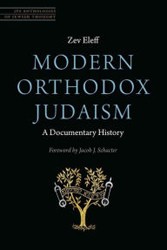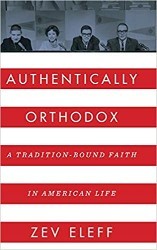Zev Eleff is the author of Modern Orthodox Judaism: A Documentary History. He is guest blogging for Jewish Book Council all week as part of the Visiting Scribe series here on The ProsenPeople.
In May 1969, Rabbi Norman Lamm published an essay on “Modern Orthodoxy’s Identity Crisis” in a magazine circulated by the Orthodox Union. His mission was ambitious: to identify and grapple with the struggle of modern Americans who were concomitantly committed to Orthodox Judaism. Rabbi Lamm also offered some salience rather than musings. The essay transformed Rabbi Lamm and Modern Orthodox Judaism into a movement marked by stability and rooted identity.
Of course, Rabbi Lamm did not do this alone. Young women and men — many of them, first-generation day school graduates — joined in, and revitalized Orthodox Judaism in the United States. He also benefited from a respectful form of Orthodox discourse. Differing points of view were welcomed as essential elements of a more wholesome conversation. In 1965, the editors of the Rabbinical Council of America published an article authored by Dr. Eliezer Berkovits in the pages of its journal despite the the fact that “most of our Editorial Board disagree with the views expressed in this essay.” Rather than reject the paper, the Orthodox rabbinical organization included it as a marker of communal “revitalization.”
The maintenance of informed and diplomatic public conversation is essential, particularly in anxious moments of tumult. Lately, talk of an “identity crisis” within Modern Orthodox Judaism has resumed. By and large, the discourse takes place in the arena of social media. It is therefore an undaunted conversation. It lacks a moderator and moderation. The rightist wing refers to a “crisis” as it writes off an outmoded “ideology [that] is murky and vague.” The leftists allude to the same crisis, characterizing it as “trying times for Modern Orthodoxy.”
Both sides rehearse similar revisionist histories. Invariably, these sorts of writers and bloggers cite Dr. Bernard Revel, an early president of Yeshiva University, and Rabbi Joseph B. Soloveitchik, considered Yeshiva University’s most important historical figure. Their conclusions typically call for change, a Modern Orthodoxy defined by “approaches that came straight from the greatest of European yeshivos” or a vision intended to be, frankly, “something new.” The middle-of-the-road outlook is not too often considered. Further, these kinds of expositions rarely engage the primary sources. They lack texture and nuance, draining the past of all its color and creativity. In the end, these writings are the stuff of polemic; not the language of constructive discourse.
Still, there is more to it. Increasingly, Orthodox Jews turn to social media to take part and read blogposts, articles, and comments on the gripping religious issues of the day. These are the forums in which many Orthodox Jews obtain religion, though an informal type. For many, Facebook and Twitter have emerged as sacred spaces to acquire Judaism and Jewish content. Of course, the synagogue and other important cultural centers still offer much, but these “traditional” institutions compete with digital venues that are always open and are constantly uploading new content. In most cases, it is hardly a contest — after all, the rabbi’s sermon is only a weekly occasion, and adult education classes simiarly must fit into some sort of restrictive schedule. By contrast, Facebook threads are timeless, untethered, and hyperlinked.
Relevance and promptness have assumed unprecedentedly precious qualities of religious commodities. Owing to this, rabbis and educators take to the Internet for this very sort of relevance. The savviest among them upload their sermons and author blogs. These women and men recognize that to be someone of consequence they must become a part of the online conversation.
There is an alluring and democratizing aspect of Facebook. The elites — the most educated, title-holding lot — no longer have so much control. Social media is a dialogue — not a monologue, after all. Consider Daniel Rosenthal’s recently polemical tract, Why Open Orthodoxy Is Not Orthodox. In his tirade against the Orthodox Left, the author marshaled loads of extra-academic evidence that amounted to 487 footnotes: the lion’s share of these citations were drawn from Facebook and YouTube. In one exercise of social media arithmetic, Rosenthal actually counted the number of times a Facebook post was “liked” by members of a particular Orthodox group.
Of course, there are drawbacks to the new mode of discourse. Most notably, this sort of unhinged conversation tends to introduce historical errors and oversimplifications. The Modern Orthodox community is far from unique in its embrace of online media as a primary form of discourse. Similar trends are evident in other Jewish communities, and within other religious spheres. Modern Orthodoxy is also not the only one undergoing a so-called “identity crisis.” It is, however, the one that I can best help — that’s why I authored Modern Orthodox Judaism.
Featuring more than 180 texts and images, this documentary history seeks to equip the present digital dialogue with a sturdier foothold within the sources. The anthology aims to restore sophistication and nuance to the new discourse. Far from claiming to offer the final say on any matter, the user-friendly commentaries and annotations are meant to bolster a more informed conversation. For instance, the material on Orthodox Judaism’s parting of the ways with Conservative and Reform, the role of rabbinic authority and the place of women in stations of leadership are crucial. These subjects are pertinent to the classroom, the synagogue pulpit, Facebook and wherever else we may strike up an intriguing conversation on the past and future of Orthodox Judaism in the United States.
Zev Eleff is the chief academic officer of the Hebrew Theological College, Chicago. He is the author of five books and over thirty scholastic articles. His book Modern Orthodox Judaism: A Documentary History was recently published by the Jewish Publication Society.
Related Content:
- Joshua Cohen: The Doomed Generation
- Christoph Kreutzmüller: Adding Dimension to the Online Database of Jewish Businesses in Berlin
- Gloria Spielman: My First Writing Group: The Internet
Zev Eleff is the chief academic officer of the Hebrew Theological College, Chicago. He is the author of five books, including Living from Convention to Convention: A History of the NCSY, 1954 – 1980, and editor of Mentor of Generations: Reflections on Rabbi Joseph B. Soloveitchik. He has also authored more than thirty scholarly articles.
The New Digital Discourse and Modern Orthodox Judaism
In Whose Image? Maimonides Among the Portraits of the Lawgivers



